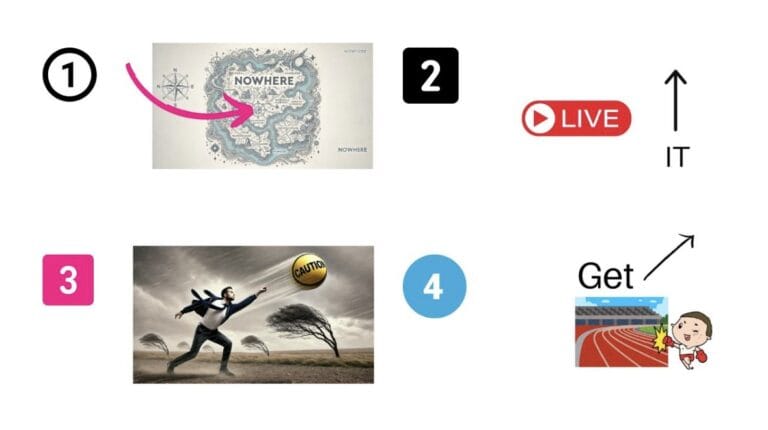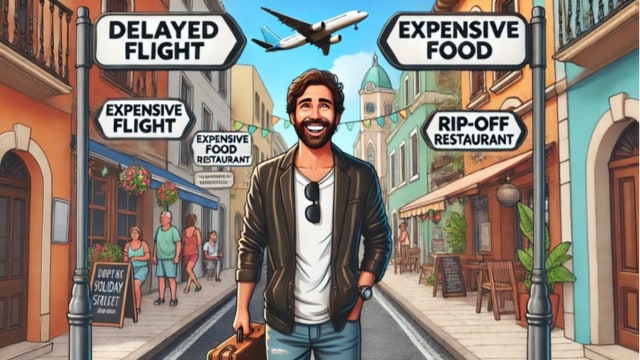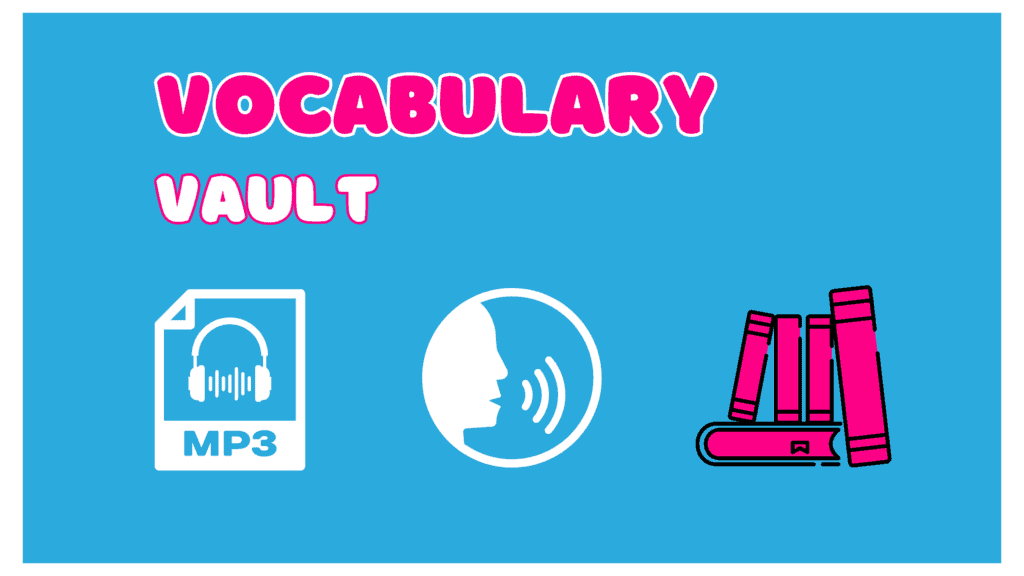IELTS Speaking Lesson about Holidays
👇 Take this lesson with you! 👇
Table of Contents
IELTS Speaking Vocabulary: HOLIDAYS
1) A holiday = a time when you don’t work, so you can travel or relax
I’m going on holiday next week
I am taking a holiday next month
2) A holiday = an official day off work, for national or religious celebrations
- A bank holiday (In the UK this is usually Mondays)
- A public holiday
- A religious holiday
Christmas is my favourite holiday
Next Monday is a bank holiday, we’re going to the beach for the day.
Synonyms
- A vacation (U.S.)
- A break
- A getaway
- An excursion
- A trip
- A day trip
- A day out
Collocations
A /an ________ holiday
- camping
- skiing
- summer / winter
- beach
- package (where everything is included, food, tours, drinks, travel…)
- all-inclusive (same as package holiday)
- cruise (going on a ship)
- adventure
- backpack
I prefer beach holidays
Let’s go backpacking
A _____ break
- city (visit a city)
- countryside
- beach
We are going on our honeymoon
Let’s take a city break
I want to go on a city break
Destination (n. C) /ˌdɛstɪˈneɪʃən/ = the place where you are going
Spain is a popular destination for holiday makers
Italy is our holiday destination this year
Synonyms (for people on holiday)
- A holiday maker
- A sightseer /ˈsaɪtsiːər/
- A tourist
- A traveller
- A nomad
- A visitor
To see the sights = to visit famous places such as a museum, a statue, a monument, etc…
A digital nomad = a person working online and moving / living in different places for periods for time.
Accommodation (n. U) /əˌkɒməˈdeɪʃən/ = a place where someone may live or stay.
We need to book the accommodation
I can’t find any cheap accommodation
Itinerary (n. C) /aɪˈtɪnərəri/ = a planned route or journey – a list of destinations, times, activities…
Have you made a travel itinerary?
Have you made a daily itinerary for your holiday?
Budget (n. C.) /ˈbʌdʒɪt/ = A financial plan
We need to draw up a budget (=to make)
Let’s stick to the budget (=to follow)
It’s not within our budget (=too expensive)
To budget (v.) /ˈbʌdʒɪt/ = To plan how much you will spend
I haven’t budgeted for food
Budget (adj.) Cheap, cost-effective
This is a budget hotel
We can choose a budget airline
IELTS Speaking Idioms: HOLIDAYS
Can you guess these idioms?

Click the arrow to see the answers
1) In the middle of nowhere
A place that is very remote and isolated.
We found a great cabin in the middle of nowhere.
2) To live it up
To enjoy life in a lively, extravagant, or luxurious way.
They wanted to live it up on their holiday, so they stayed at a five-star resort.
3) To throw caution to the wind
To not be careful. To take a risk, without considering the consequences.
I was busy at work, but we threw caution to the wind and booked a last-minute holiday package.
We don’t have a lot of money, but we decided to throw caution to the wind, and book a holiday.
4) To get off the beaten track / path
To go off the beaten track / path
To visit a place that is not well-known or frequently visited.
We prefer destinations that are off the beaten path to avoid crowds.
Listening Bingo: Planning a Holiday
The Holiday: Part 2
Listen to Part 2 of the story ‘The Holiday’
Click the arrow to see the full script
Full Script
Having chosen their destination, Emma and John now had to book the flights, decide where to stay, what to visit and make a budget.
Booking the flights was a piece of cake (=easy) because there was a budget airline that went from London to Vienna so they used that one.
Organising accommodation was not so straightforward (=easy, simple). They could opt for (=choose) a hotel or an apartment. Emma preferred the idea of a hotel in the middle of town, where everything was taken care but John was up for renting an apartment on Airbnb because of the independence it gave them.
They mulled it over (=think something over) and Emma tried talking
John into the idea of booking a hotel, a nice hotel so they didn’t have to worry about self-catering (=cooking for yourself) or cleaning. John was hesitant, but in the end he agreed to throw caution to the wind and splash out on (=to spend a lot of money on) a four star hotel slap bang in the city centre (=right in the very centre of the city)
Finally, when it came to budgets they both agreed. They weren’t used to budgeting for holidays. They both felt it was a one-off (=something they would only do once), so they would spend as much as they wanted to have a good time.
Dad Jokes
1) What happens when you wear a watch on a plane?

Click the arrow to see the answer
Time flies!
2) What do you call a traveler that doesn’t lose his/her temper? (Doesn’t get angry!)

Click the arrow to see the answer
A nomad
To be mad = to be angry
IELTS Speaking Part 2: Model Answer
The Holiday: Part 3
Watch John talk about his recent holiday.
1) In your opinion, what was the worst thing about the holiday?
Click the arrow to see the answer
The answer will depend on your opinion, but possible answers include,
- The delay of the flight
- Waiting in the airport
- The hotel overlooking the disco
- The church bells ringing on Sunday morning
- Not being able to sleep in
- The lack of sleep and rest
2) Watch again and note any useful collocations
Click the arrow to see the full script
Full Script
Let me tell you about a holiday nightmare my wife and I had. Recently we had decided to take a city break to Vienna.
So, there we were, excited about our holiday. We had booked a budget airline to save a few pounds. Little did we know, that was a mistake.
Our flight was delayed. And not just a little late, but hours late. We were stuck in the terminal, surrounded by other frustrated holidaymakers.
It was noisy and uncomfortable. Nowhere to sit, and no updates about the flight.
Finally, 12 hours later, we took of, tired and fed up (=bored and angry)
But the adventures had only just begun. We arrived at our destination, only to find that our accommodation was a nightmare.
We had splashed out (=to spend a lot of money) on a supposedly top-notch hotel (=excellent), expecting a bit of luxury. It turns out, (=in the end) our room overlooked a disco on a busy street.
That first night we couldn’t sleep a wink (=couldn’t sleep at all) and although we complained in the morning, the hotel was fully booked, so we couldn’t change rooms.
And then came Sunday. We discovered that our hotel was right next to a church. The bells started ringing in the early morning and didn’t seem to stop. We couldn’t sleep in, (=stay in bed for a longer time deliberately) and even when we tried to put our feet up (=to relax) after lunch, it was impossible.
The city itself was lovely, though. It was a great place for an excursion or a quick city break. We enjoyed exploring, but the lack of sleep and constant noise was really too much.
If we had known, we would’ve definitely chosen a place off the beaten track.
We were hoping to live it up, but in the end, we were just fed up. Better luck next time, I guess!
Pronunciation Files For Vocabulary From My Best Live Lessons
Use Words EASILY in English Conversations!
More Free Lessons
If you liked this lesson about music in IELTS Speaking, leave a comment below!
There are more lessons you can follow in the links below too.
HEALTH in IELTS Speaking. Idioms and vocabulary to learn how to talk about Health.
CLOTHES in IELTS Speaking Vocabulary you need to describe clothes you like and dislike, as well as formal and informal styles.
MEDICINE in IELTS Speaking Learn the COVID Vocabulary for IELTS Speaking and talk about Alternative Medicines using idioms and vocabulary.
TRANSPORTATION in IELTS Speaking Learn th different types of transportation, both public and private, as well as the problems transportation systems have.
JOBS in IELTS Speaking Vocabulary you need to answer questions in Part 1, 2 and 3 for the topic of jobs.

